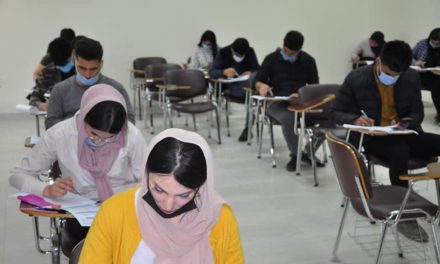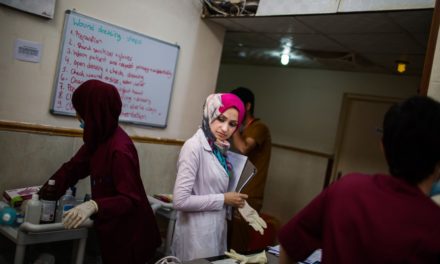The form of governance in the semi-autonomous region of Iraqi Kurdistan is one of kleptocracy, where political leaders use their political power to seize people’s property and wealth to enrich themselves and consolidate more power. This is true for both ruling parties, the Kurdistan Democratic Party (KDP) and the Patriotic Union of Kurdistan (PUK). Kleptocratic rule is done through corruption, lack of transparency, monopolization of economy, weakening the legal system, land-grabbing, and the use of partisan paramilitaries.
The extent of corruption is prevalent throughout all of Iraq, and Iraqi Kurdistan is no different. The issue is so prevalent and old, that the region’s authorities have long acknowledged its negative impact. In a letter dated 31 January 2011, then president of Iraqi Kurdistan and leader of the KDP, Masoud Barzani, mentioned that corruption is a serious issue that needs to be addressed. Five years later, in an interview with Al-Monitor in 2016, Barzani described the threat of corruption in Iraqi Kurdistan as a matter of life and death, indicating that, just as they fight ISIS with all their strength, they must also combat corruption with the same intensity. However, corruption remained an issue for future governments as the governor of Erbil announced in 2019 that corruption is the biggest challenge facing the region’s institutions, stressing the need to confront it resolutely. Despite recognizing the seriousness of corruption, the ninth cabinet of the Kurdistan Regional Government (KRG), formed in 2018, has not achieved tangible results in its promised reforms. For example, while the KRG needed 880 billion Iraqi dinars in 2019 to pay salaries, by 2023, it needed 920-940 billion Iraqi dinars. This increase highlights the ninth cabinet’s failure to implement genuine reforms.
Since 2005, the KRG has only had a budget law for four of those years: 2009, 2010, 2011, 2012. Former speaker of the Kurdistan parliament, Rewaz Faeq, stated, “I have repeatedly mentioned that the absence of a budget law is merely to prevent scrutiny of the KRG“. The lack of a budget law and the failure to present a budget bill to the parliament creates significant opportunities for corruption and lack of transparency. The parliament’s oversight body is unaware of the region’s revenues and expenditures. Moreover, the income from oil sales, customs revenues, and internal revenues are not transparent, and the exact income of the KRG is unknown. The lack of transparency in revenues indicates that the ruling parties fear transparency because they are not clean-handed.
A simple question then arises: If KDP and PUK officials do not have significant economic interests in power, why do they cling to it and fear holding elections? The answer is clear: the seat of power has created vast economic benefits for the officials of these two parties, and they fear losing these benefits if they lose power. Therefore, both parties make every effort to maintain their armed control without the people’s consent. They need to either avoid holding elections or, if held, undermine public trust in the electoral process. This effort includes suppressing all civil movements aimed at political reform, silencing dissent, preventing protests, weakening civil society organizations, and restricting freedom of expression by arresting journalists and shutting down media outlets.
Hence, the widespread level of corruption in Iraqi Kurdistan underscores that the region’s authorities use their power for self-enrichment and accumulation of private wealth. Many companies in the region are either owned by officials or have significant shares controlled by them. Additionally, trade and markets are dominated by the two parties.
The KDP and PUK’s governance does not allow for the growth of a legal and orderly state, which is why they weaken legal institutions, particularly the judiciary. These parties practice a form of de facto authority in Iraqi Kurdistan that prevents the parliament from questioning senior government officials. Moreover, they use various means to undermine the parliament. Additionally, this de facto governance hinders the judiciary from being independent, making it difficult to prosecute senior officials for corruption, as the General Prosecutor’s Office is a part of the region’s Ministry of Justice, under the government’s control.
In recent years, the KDP and PUK have engaged in the confiscation of agricultural land and rural areas. These political leaders convert agricultural lands and hills into residential areas for sale or build apartments, villas, and estates for personal gain. This is possible through the use of partisan armed forces, which the KDP and PUK prevent from integrating into professional state forces. Losing their armed wing of their party means they cannot protect their assets, wealth, and overall power. More importantly, they are used to suppress and eliminate political rivals. Partisan forces only need to exist outside the law because they do not trust the law and believe they must protect themselves.
In conclusion, the governance of the KDP and PUK is kleptocratic rule, and these parties have a narrow, authoritarian worldview. They cannot become modern, democratic parties capable of building good governance. The appropriate solution to this situation is to change the KDP and PUK through the electoral process. Otherwise, their strong-armed rule will continue, and the people’s lives will worsen. Additionally, the international community must actively support and monitor elections in Iraqi Kurdistan to ensure they are free and fair.

Hawre Hasan Hama
Dr. Hawre Hasan Hama is a lecturer at the University of Sulaimani.










